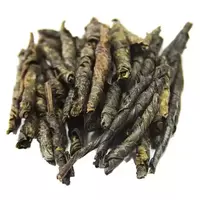Kudin tea

Kudin or khudin tea may not actually refer to tea varieties. In fact, kudin is a drink made from leaves of the broad-leaved Holly plant. However, the lack of kinship with the tea tree does not reduce the beneficial properties of kudin tea. The broadleaf holly is a subtropical and evergreen tree that is native to the southern provinces of China.
The interesting thing is that the kudin tea holly is grown on the shadow slopes of the mountains, where ideal conditions for the plant are created. The exclusivity of kudin tea is due to the special growing conditions and the quality of the final drink, which has unique taste and aroma properties. In China, kudin tea has been produced for centuries. According to ancient Chinese legend, Emperor Tang Tianbao (744 AD) decided to find out the recipes that his subjects use to maintain beauty and youth.
The son of Heaven wanted to give his beloved beauty Yang Guanting an elixir of "long spring. " The emperor received kudin tea as a gift from the monks of the Sykongshan Monastery and presented it to the beauty. Since then, the drink has been considered a means to achieve eternal beauty and youth. Therefore, residents of the Celestial Empire were able to test the useful properties of kudin tea. In Chinese Folk Medicine, kudin tea is considered a cure for many chowrei.
Most often, kudin tea is used as an antipyretic, bactericidal and diuretic. In addition, kudin tea contributes to the detoxification of the human body. As a result of scientific research, it was established for certain that frequent consumption of kudin tea normalizes blood sugar and blood pressure. Many nutritionists advise using kudin tea to normalize digestive and metabolic processes for diseases of the gastrointestinal tract.
There are several varieties of kudin tea that differ in the shape of the leaf, however, they all belong to a single type of Khu Cha or "bitter tea. " The name, as it is impossible to accurately characterize the taste of tea. Kudin belongs to the elite varieties of the drink. The cost of some varieties of kudin tea reaches thousands of US dollars. Kudin Shui Xiu from Sichun province is considered the benchmark for the quality of the drink and costs fabulous money.
Kudin is brewed in the same way as ordinary black tea. Dry brew in the form of holly leaves should be poured with boiled water, suitable temperature. It is important to be sure to keep the temperature by brewing kudin to reveal the entire taste palette of the drink. If you pour boiling water over the kudin, you get bitter Khu Cha tea, and at a temperature of 50 C, the drink will reveal its noble and refined aroma. It is not worth brewing a large number of tea kudin leaves. As a rule, only a couple of leaves per person is enough to get a boost of energy and cheer up.
kudin tea 16 kCal
Energy value of kudin tea (Ratio of proteins, fats, carbohydrates - ju):
Proteins: 0.83 g (~ 3 kCal)
Fats: 0.84 g (~ 8 kCal)
Carbohydrates: 1.17 g (~ 5 kCal)
Energy ratio (bj | y): 21% | 47% | 29%
 Español
Español Français
Français Português
Português Русский
Русский 简体中文
简体中文 繁體中文
繁體中文 日本語
日本語 한국어
한국어 العربية
العربية Türkçe
Türkçe Қазақ
Қазақ Deutsch
Deutsch Italiano
Italiano Українська
Українська
